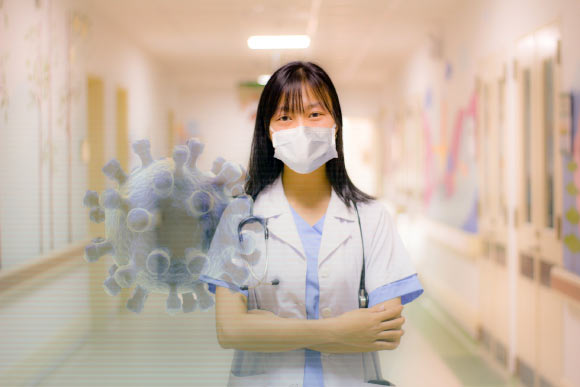In new laboratory experiments conducted by researchers from the University of Maryland, the University of Hong Kong and Harvard School of Public Health, surgical masks significantly reduced the amounts of various airborne viruses coming from infected patients. Conducted prior to the current COVID-19 pandemic, the study does not address the question of whether surgical masks protect wearers from infection. It does suggest that masks may limit how much the infected — who in the case of the SARS-CoV-2 coronavirus often don’t have symptoms — spread diseases including influenza, rhinoviruses and coronaviruses.

Surgical face masks could prevent transmission of human coronaviruses and influenza viruses from symptomatic individuals. Image credit: Mohamed Hassan.
In 2013, senior co-author University of Maryland’s Dr. Don Milton and colleagues demonstrated that surgical masks could help limit flu transmission.
“However, the effect may not be as great outside of controlled settings,” Dr. Milton said.
“Nevertheless, the chance surgical masks could help justifies taking a new look at whether all people should be encouraged to wear them when they venture out of their houses to stores or other populated locations during the current COVID-19 lockdown.”
“In normal times we’d say that if it wasn’t shown statistically significant or the effective in real-world studies, we don’t recommend it. But in the middle of a pandemic, we’re desperate. The thinking is that even if it cuts down transmission a little bit, it’s worth trying.”
Previous studies have shown that the SARS-CoV-2 coronavirus and other respiratory infections are mostly spread during close contact, which has been interpreted by some infectious disease specialists to mean that the disease could spread only through contact and large droplets, such as from a cough or sneeze — a message that has often been shared with the public.
“What they don’t understand is that is merely a hypothesis,” Dr. Milton said.
“The current study shows, by contrast, that tiny, aerosolized droplets can indeed diffuse through the air. That means it may be possible to contract COVID-19 not only by being coughed on, but by simply inhaling the breath of someone nearby who has it, whether they have symptoms or not.”
“Surgical masks, however, catch a lot of the aerosolized virus as it’s exhaled.”
The researchers recruited 246 people with suspected respiratory viral infections.
The breath-capturing ‘Gesundheit II machine’ developed by Dr. Milton compared how much virus they exhaled with and without a surgical mask.
“In 111 people infected by either coronavirus, influenza virus or rhinovirus, masks reduced detectable virus in respiratory droplets and aerosols for seasonal coronaviruses, and in respiratory droplets for influenza virus,” said first author Dr. Nancy Leung, a researcher at the University of Hong Kong.
“In contrast, masks did not reduce the emission of rhinoviruses.”
Although the experiment took place before the current pandemic, COVID-19 and seasonal coronaviruses are closely related and may be of similar particle size.
“The ability of surgical masks to reduce seasonal coronavirus in respiratory droplets and aerosols implies that such masks can contribute to slowing the spread of COVID-19 when worn by infected people,” said senior co-author Professor Benjamin Cowling, also from the University of Hong Kong.
Dr. Milton pointed to other measures the research found is even more effective than masks, such as improving ventilation in public places like grocery stores, or installing UV-C lights near the ceiling that works in conjunction with ceiling fans to pull air upwards and destroy viruses and bacteria.
“Personal protective equipment like N95 masks are not our first line of defense,” Dr. Milton said.
“They are our last desperate thing that we do.”
The team’s paper was published in the journal Nature Medicine.
_____
N.H.L. Leung et al. Respiratory virus shedding in exhaled breath and efficacy of face masks. Nat Med, published online April 3, 2020; doi: 10.1038/s41591-020-0843-2







